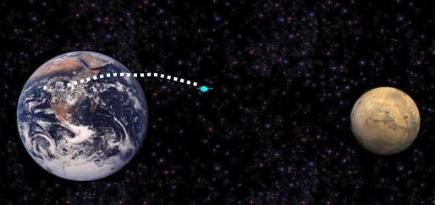| Adapted for the Internet from: Why God Doesn't Exist |
1.0 The evacuation of 10 billion earthlings
In order to justify funding for their space projects, leading scientists argue that one day we will have to evacuate the Solar
System anyway because the Sun has a limited lifespan. If the calculations are correct, our star is in its middle age and has
about another 5 more billion years to go.
However, evacuation, colonization, and exploration are wholly different motives for justifying the allocation of funds. For
starters, money that would otherwise be unavailable for exploratory research could become unconditional in case of an
emergency.
But can we realistically visualize evacuating billions of people from the Earth in slower-than-light spaceships to sun-like
stars Alpha Centauri A or Tau Ceti 12 light-years away? Will the Solar System ever generate the resources to construct the
number of vehicles needed for such massive exodus? Can we imagine 10 or more billion people, most of them beyond
middle age, travelling forever through space, with the purpose of seeking asylum from cousins, or vice versa, they from us?
Or can we imagine established, overcrowded colonies sharing land and resources with invading remnants? Well, what do
you think would happen today if the entire continent of Africa fell on hard times? Would the rest of the world partake 400
million new immigrants?
Interstellar evacuation is a ridiculous idea that starry-eyed dreamers entertain without giving it much thought. They should
turn their TVs off for a few minutes so they can concentrate on the impossible scenario involved.
Perhaps we will do it simply to ease overcrowding. We get rid of a few million volunteers.
Unlikely! First, these small numbers would not make a dent on the total population, and then the Earth could just as well
recover the losses in no time. If the population stagnates, there is no reason to make the trip in the first place. Regardless
of the available habitable surface in the entire Centauri System, the colonists would spread like wild fire before a significant
number of earthlings embark to alleviate overpopulation here. Certainly, the surface of Mars is significantly smaller than the
Earth's. Mars can probably hold a fourth of what the Earth can hold. Therefore, Mars is not going to help us at all if the
problem is overcrowding.
- ________________________________________________________________________________________
- Last modified 02/27/08
- Copyright © by Nila Gaede 2008

| Now that we have claimed this land in the Centauri System for the U.N., should we start collecting coconuts, Captain Al? |

| Stop it! You're killing me! I'm marooned with two loonies in the middle of nowhere, and they're talking about commercial ventures! |
- Module main page: Why we won't colonize the Solar System or travel to the stars
Pages in this module:
- 1. Mother Nature's Grand Plan
2. Speed is of the essence: Why we will never travel to the nearest star
3. What if we could travel at c?
4. This page: News Flash: The politicians unanimously vote to allocate trillions for a tour to the nearest star
- 2.0 Sons of the pioneers
How about colonization? Is this any better?
Who would be the first to go? A poor, persecuted sect of suffering Bolivian pilgrims? Or maybe we should take the opportunity
to evacuate the prisons and force inmates to board the craft at gunpoint?
Interstellar colonization would be expensive and government run, nothing remotely like the conquest of the American continent.
Under the best of circumstances it would be reserved for an elite destined to go one way. Would the whole of humanity pitch in
for a select few to begin a colony at a far away place that would forget the motherland upon founding? In what manner would
that help Earth? Would they claim the land for the U.N. Secretary General or for the Queen of Spain?
Or perhaps the idea is to develop some brisk, mutually profitable commerce?
What would traders bring in their 30 lb lightsails? Spices? Local commerce would clearly be more profitable, and colonists
would naturally appropriate the regional resources for their own needs. Nevertheless, we are assuming that the Solar System
is self sufficient, has a stable population, and has invented everything there is to invent under the Sun when our pollen spreads
to the stars. What would we need Proxima’s produce for and at such exorbitant prices? The transportation costs alone would
be prohibitive.
Maybe we would colonize just because of our natural animal instinct to propagate the human race?
This would really be quite a motive. 'Propagation' is rapidly dying in all advanced countries, where people procreate at much
slower rates today and care even less for their offspring. How powerful a motive this will be in 100 years remains to be seen.
I discuss it in more detail in the section dealing with fertility. For those who missed it, the age of colonization happened 500
years ago when young, curious adventurers had yet much to discover here on Earth. There is no room for colonization in a
world where an older, stable population, having discovered everything of relevance that there is to discover settles in for a
quiet life of remembrance and prepares for extinction. Colonization would amount to an expensive giveaway that gains
nothing for Earth. At best a very small percentage of the human population would ever make such a trip. For what? To send
an elite one way at the price of emptying the world's coffers? One thing is to go to the Moon or to an orbiting space colony
for a couple of weeks. Another is to risk suicide by travelling, in the best of cases, for a boring, perilous five years to a planet
terraformed in advance by robots when you can be safe back in the comfort of your home watching it on TV. Why would
anyone risk such a trip? To lose 5 years of his life in space, luckily reach Centauri, and see the same thing we saw on Earth?
The discovery and colonization of America is not even remotely an analogy for the conquest of Centauri.
Maybe our destiny is in intergenerational travel: to preserve the human race against the wishes of Mother Nature. We could
begin, for example, by fabricating torus-like habitats designed to orbit planets or satellites of the Solar System. Materials for
these habitats could be cannibalized from asteroids and the Moon, for example. Once an entire generation of space-children
is born, living at the torus will be second nature.
So far so good. Now, tired of orbiting the same dumb old satellite, a revolution occurs. A new generation of teenage
entrepreneurs rebels and decides to risk it all. They pool their resources, build their own torus-space-ship, retrofit it with
powerful antimatter rockets, fuel which they skimmed in secret from their parents, and begin their suicide attempt to reach
Alpha. I say suicide because if they ever make it, they’ll be older than Rip Van Winkle. Obviously, the trip is a gift to their
grandchildren, a sentiment hard to believe will be second nature in the incoming alienated young generation of Earth. But
assuming best case scenario, these teenagers will fly throughout their lifetimes without seeing anything but space. Their
rebellious nature has led them to live the most boring life anyone can imagine just so their grandchildren can orbit a far
away stone just like their wiser parents did in the old days. Sounds reasonable?


| Finally, we leave that stinking hell hole. It was just too overcrowded and polluted! A great Eden awaits us in Mars! There, in that gigantic land, we will be able to multiply like the sands of the desert. |

| Yes, my faithful Stevie. Our mission is to bring back enough food to feed Earth. We should begin our enterprise immediately! |

| News flash: The politicians unanimously vote to allocate trillions for a tour to the nearest star |

3.0 Go where no man has gone before, but go!
There is also the possibility of sending an exploratory probe to Alpha simply for scientific purposes.
For what? To see a sun we already know much about and dead Mars-like rocks floating around it? At a cost of trillions?
Why would we go through such trouble when we’ve already settled that we’re not going to colonize or evacuate. The
likelihood of finding a planet teaming with life is next to nil, and terraforming would take more years than anyone will live.
What these arguments really show is that idealistic proponents have had enough with the politicians and want to get out
of the planet rather than stay and fix its problems. Maybe this is why governments pay back in kind by treating space
science as a hobby. The entire Universe is like what we see. There is one planet teaming with life like ours, surrounded
perhaps by millions of scattered rocks with bacteria-level life, surrounded in turn by a sea of billions of dead planets,
double stars, white dwarfs, red giants and other lifeless places. Since Earth-like planets don’t generate life all at once,
we are staggered in time and have little chance of even communicating with the nearest civilization. What do we want to
expand into the galaxy for if eventually we’re going to die anyway? What difference does it make whether it is one million
years or 100 years. We know pretty much all there is to know and discovered pretty much all we will ever discover. All that
lies ahead of us is tedium, mechanical motion, endless repetition of the same old thing. We are destined to become
dinosaurs, doing the same thing day after day, living beyond justification, facing extinction because we have nothing
more to live for. Indeed, we never had. Speed technology and resources are the limiting factors for all of the above
scenarios anyway.

| Okay amigos! Let's do it! Let's explore this planet in Alpha Centauri and see what exotic specimens we can take back to recover some of the costs of the expedition. |
